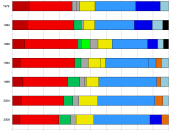The idea of creating a European common market based on the free movement of goods, persons, services and capital is not a recent one: it was born in 1957 with the Rome treaty, which was supposed to achieve the common market in 12 years. The objective was to build a European economic power, to induce a better intra-Europe growth, which would increase the level of life of its citizens. But this ambitious project proved to be more difficult to realise than expected: in 1985, as the single market was far from being achieved, the Single Market Programme began, with 1992 as a deadline to complete it. On the 1st January 1993, the European Commission declared that the single market was finally in place and operational. However, a question is now being asked: after so many promises, is the single European market functioning as intended?
This is an interesting and rather actual debate more especially as the Commission was recently celebrating the 10th anniversary of the internal market.
Moreover, the question of the success of the single market is at the core of the debate between pro Europeans and Euro sceptics because of the imminent enlargement and the recent monetary union, which are linked to the single market. Of course, the Commission gives a glory picture of the single market, but some people argue the contrary. In a first part, we will briefly explain the concept of single market. Then, the two next parts will expose the arguments for and against the single market.


